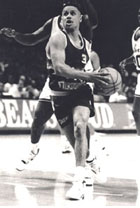
By the Dawns Early Light, Chris Jackson’s Journey to Islam 2004
Distributed by Cinema Guild, 115 West 30th Street, Suite 800, New York, NY 10001; 212-685-6242
Produced by Zareena Grewal
Directed by Zareena Grewal
VHS, color, 52 min.
Jr. High - Adult
Religious Studies, Human Rights, American Studies
Date Entered: 11/15/2004
Reviewed by Paul Moeller, University of Colorado at BoulderBy the Dawns Early Light examines the place of Islam in American society on the eve of 9-11 through the very notable and emotional story of Mahmoud Abdul-Rauf. Abdul-Rauf came to the awareness of basketball fans when, as a freshman then named Chris Jackson, he proved to be a dynamic scorer for Louisiana State University. Jackson had turned to basketball to overcome Tourette’s syndrome and poverty to make something of his life. His efforts were validated when he became a high draft pick of the NBA’s Denver Nuggets. Jackson’s life to this point served as an epitome of an American success story. However, a few years after converting to Islam and changing his name to Mahmoud Abdul-Rauf, Abdul-Rauf became a controversial figure when he refused to stand at attention for the national anthem before Nuggets’ games. In his view the flag stood for oppression and tyranny and his “Muslim conscience” would not allow him to honor it. The controversy surrounding this decision is at the heart of Grewal’s film.
Through interviews with Abdul-Rauf, his mother, his agent, and Muslim scholars including Khaled M. Abou El Fadl, Grewal is able to address Abdul-Rauf’s spiritual journey and how his story played out in the media. Grewal also contrasts the opinions of the African American Muslim community with those of Muslim immigrants to the United States. The immigrant Muslim population was largely critical of Abdul-Rauf’s actions while the African American Muslims were more supportive as they considered his actions to be an extension of the American tradition of dissent.
This timely film should be of value to those interested in the place of Islam in American society as a whole, the relationship of the African American Muslim community to the immigrant Muslims in particular, and the situation of Muslims in America on the eve of 9-11. It is recommended for viewers from Jr. High through adult and to the libraries that serve them.